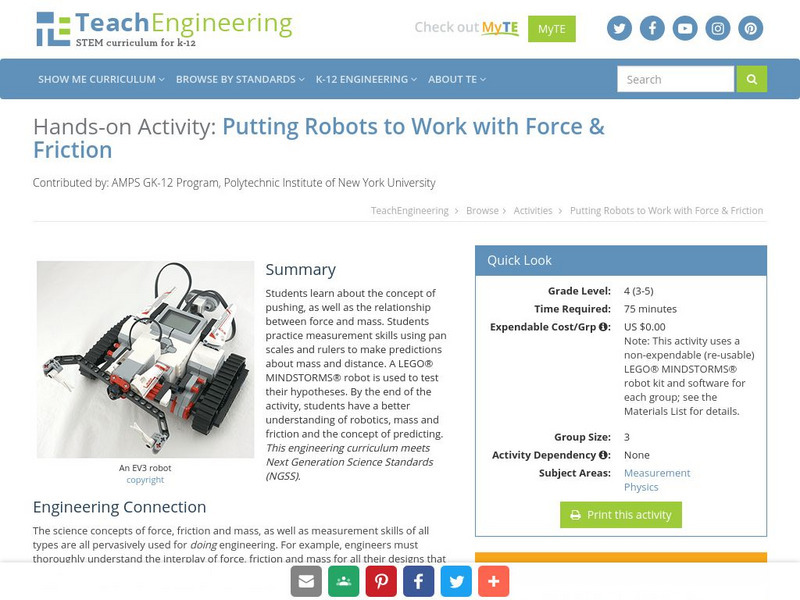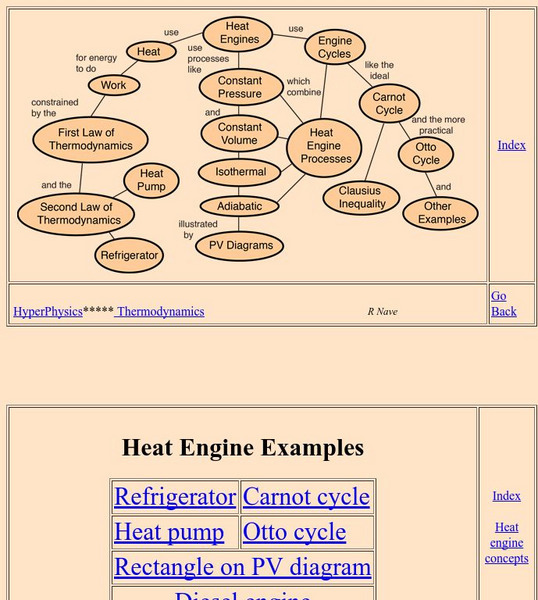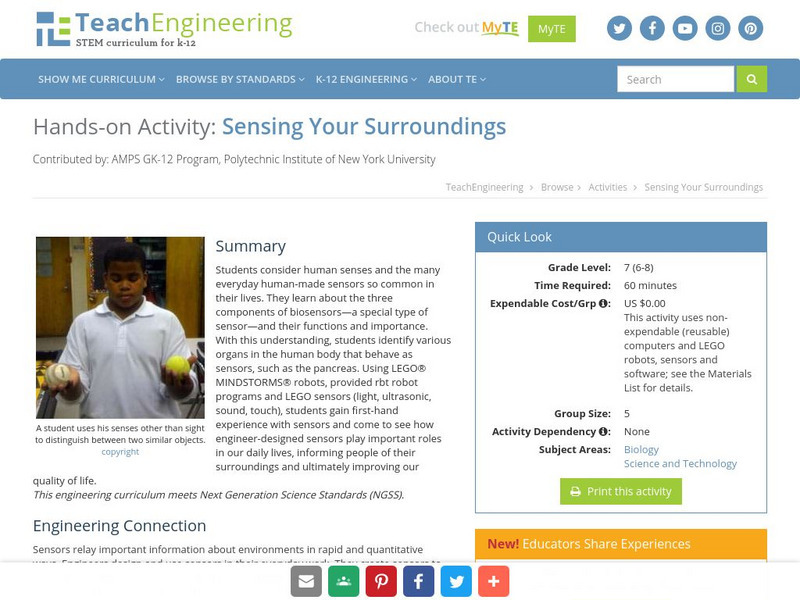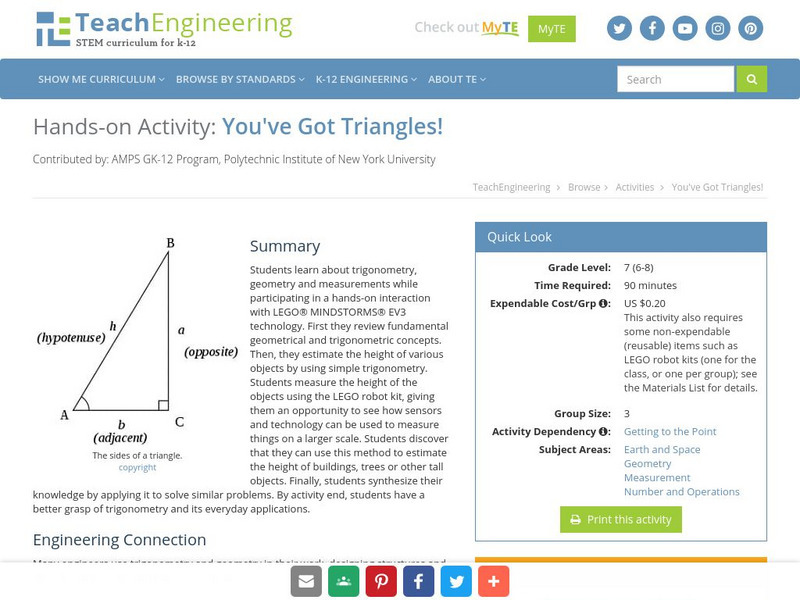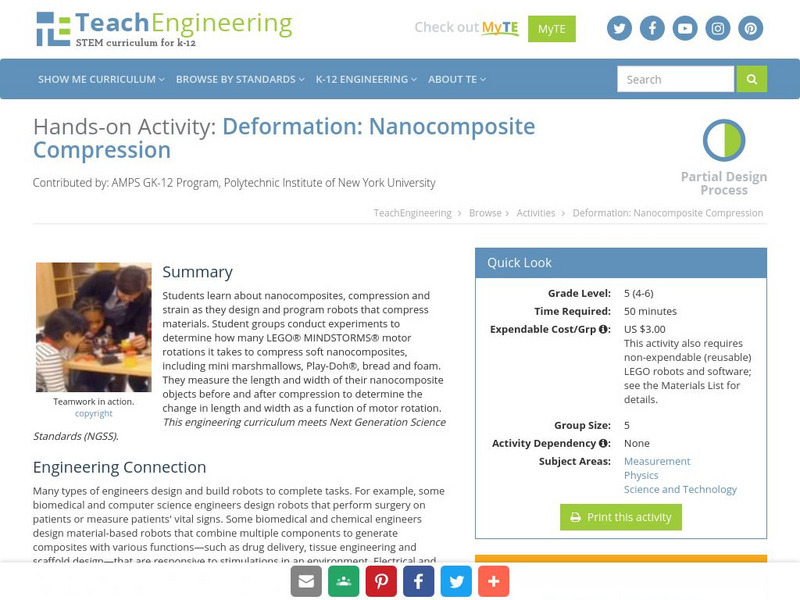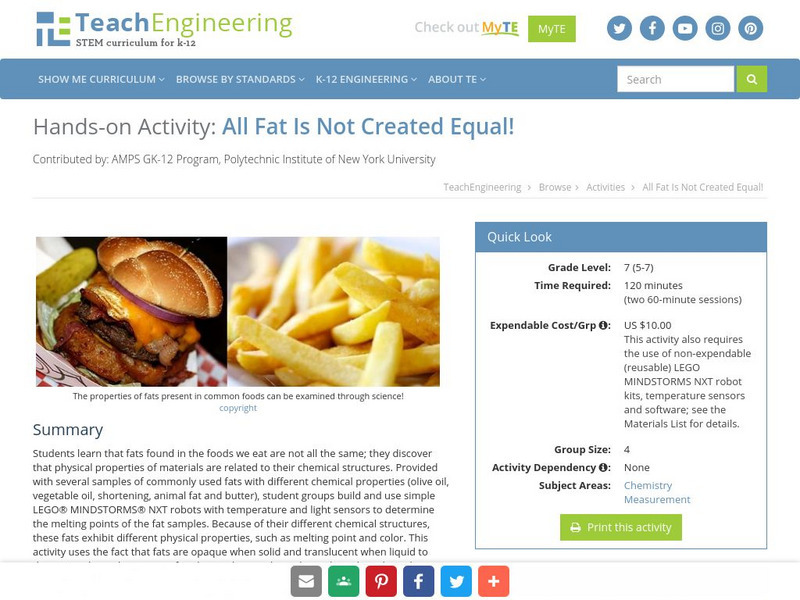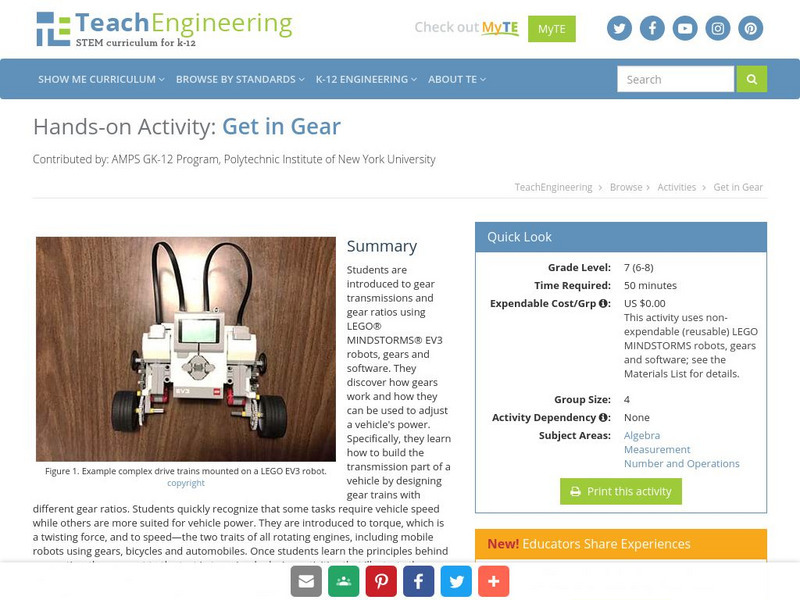TeachEngineering
Teach Engineering: States of Matter
Students act as chemical engineers and use LEGO MINDSTORMS NXT robotics to record temperatures and learn about the three states of matter. Properties of matter can be measured in various ways, including volume, mass, density and...
TeachEngineering
Teach Engineering: The Stress That You Apply
Students learn about contact stress and its applications in engineering. They are introduced to the concept of heavy loads, such as buildings, elephants, people and traffic, and learn how those heavy loads apply contact stress. Through...
TeachEngineering
Teach Engineering: Trebuchet Launch
Students work as engineers to design and test trebuchets (in this case LEGO MINDSTORMS robots) that can launch objects. During the testing stage, they change one variable at a time to study its effect on the outcome of their designs....
TeachEngineering
Teach Engineering: On Track Unit Conversion
Students use three tracks marked on the floor, one in yards, one in feet and one in inches. As they start and stop a robot specific distances on a "runway," they can easily determine the equivalent measurements in other units by looking...
Museum of Science
Ei E: Shake Things Up: Engineering Journal [Pdf]
A 34-page student journal of worksheets to accompany a lesson plan unit on designing buildings that will withstand an earthquake. [SEE: http://eie.org/sites/default/files/es_educator_guide_2014_10_09.pdf] First, they work on simple...
TeachEngineering
Teach Engineering: Wide World of Gears
In an interactive and game-like manner, students learn about the mechanical advantage that is offered by gears. By virtue of the activity's mechatronics presentation, students learn to study a mechanical system as a dynamic system under...
TeachEngineering
Teach Engineering: Materials Properties Make a Difference
Students investigate the materials properties-such as acoustical absorptivity, light reflectivity, thermal conductivity, hardness, and water resistancea-of various materials. They use sound, light and temperature sensors to collect data...
TeachEngineering
Teach Engineering: Putting Robots to Work With Force & Friction
Students learn about the concept of pushing, as well as the relationship between force and mass. Students practice measurement skills using pan scales and rulers to make predictions about mass and distance. A LEGO MINDSTORMS NXT robot is...
Technovation
Curiosity Machine: Challenges: Engineer a Pneumatic Creature
Create a creature that uses air to create motion with this challenge. Site includes tips, lesson plans, and a place for students to document their design process.
University of Houston
University of Houston: Engines of Our Ingenuity: History of the Steam Engine
From the Engines of Ingenuity web site. A lengthy page discussing ingenuity and invention as it pertains to steam engine history. Very anecdotal and interesting. Includes biographical information and interesting details about Hero of...
Read Works
Read Works: Unlocking the Inner Engineer
[Free Registration/Login Required] This five-page PDF is a fiction passage entitled "Unlocking the Inner Engineer" followed by 10 reading comprehension questions. A link to an answer key is provided. Click the double arrows on the top...
Thinkport Education
Thinkport: Water, Water, Everywhere: The Engineering Design Process
Students brainstorm new ideas during part of the engineering process of designing a water purification system.
PBS
Pbs Learning Media: Aerospace Engineering
This collection of Aerospace Engineering learning modules will allow students to explore video and interactive media resources that support the middle and high school Engineering Design core ideas.
Georgia State University
Georgia State University: Hyper Physics: Heat Engine Concepts
An indexing page for the HyperPhysics site. The page contains a concept map of links to a variety of other pages which discuss concepts related to heat engines. All pages contain informative graphics and excellent explanations.
TeachEngineering
Teach Engineering: Measuring Distance With Sound Waves
Students learn about sound waves and use them to measure distances between objects. They explore how engineers incorporate ultrasound waves into medical sonogram devices and ocean sonar equipment. Students learn about properties, sources...
TeachEngineering
Teach Engineering: Measuring Pressure
Students learn first-hand the relationship between force, area and pressure. They use a force sensor built from a LEGO MINDSTORMS NXT kit to measure the force required to break through a paper napkin. An interchangeable top at the end of...
TeachEngineering
Teach Engineering: Sensing Your Surroundings
Students learn about the components and functions of biosensors. Using LEGO MINDSTORMS NXT robots and sensors, they discover how engineer-designed sensors play important roles in our daily lives, informing people of their surroundings...
Other
Niagra College Canada: The Newcomen Steam Engine
Describes the evolution of Thomas Newcomen's steam engine development. Provides several photographs and sketches of Newcomen's machines.
TeachEngineering
Teach Engineering: You've Got Triangles!
Students learn about trigonometry, geometry and measurements while participating in a hands-on interaction with LEGO MINDSTORMS NXT technology. First they review fundamental geometrical and trigonometric concepts. Then, they estimate the...
TeachEngineering
Teach Engineering: Deformation: Nanocomposite Compression
Students learn about nanocomposites, compression and strain as they design and program robots that compress materials. Student groups conduct experiments to determine how many LEGO MINDSTORMS NXT motor rotations it takes to compress soft...
TeachEngineering
Teach Engineering: Rotary Encoders & Human Computer Interaction
Students learn about rotary encoders and discover how they operate through hands-on experimentation. Rotary encoders are applied in tools to determine angle measurements and for translations of angular motion. One common rotary encoder...
TeachEngineering
Teach Engineering: All Fat Is Not Created Equally!
Students learn that fats found in the foods we eat are not all the same; they discover that physical properties of materials are related to their chemical structures. Provided with several samples of commonly used fats with different...
TeachEngineering
Teach Engineering: Get in Gear
Students discover how gears work and how they can be used to adjust a vehicle's power. Specifically, they learn how to build the transmission part of a vehicle by designing gear trains with different gear ratios.
TeachEngineering
Teach Engineering: Haptics: Touch Command
Students experience haptic (the sense of touch) feedback by using LEGO MINDSTORMS NXT robots and touch sensors to emulate touch feedback recognition. With four touch sensors connected to LEGO NXTs, they design sensor attachments that...


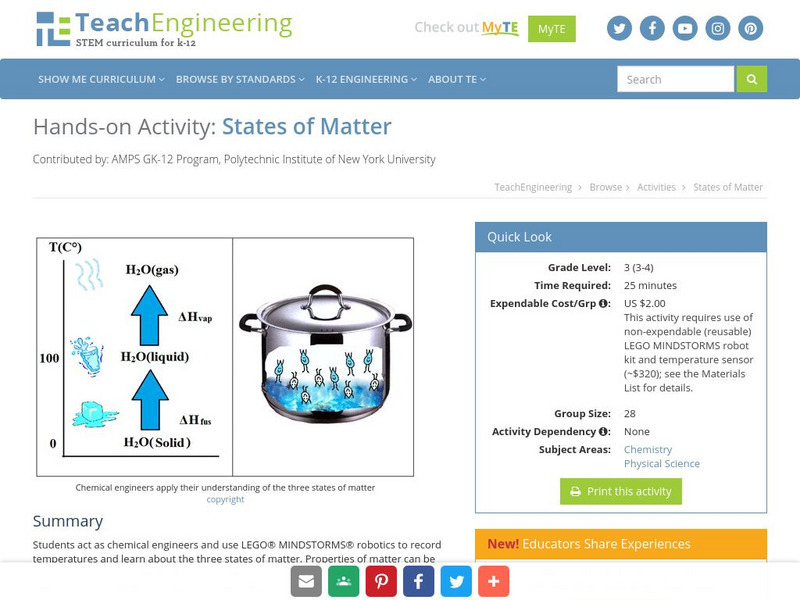

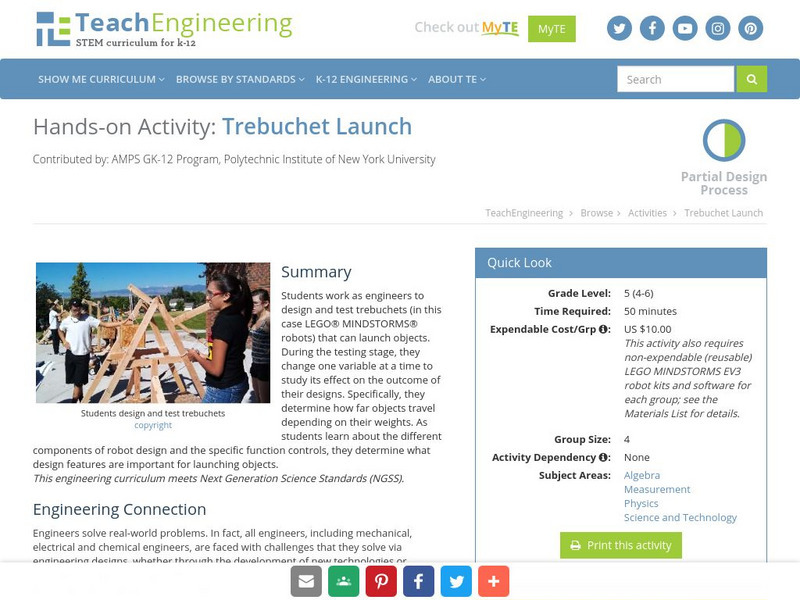

![Ei E: Shake Things Up: Engineering Journal [Pdf] Lesson Plan Ei E: Shake Things Up: Engineering Journal [Pdf] Lesson Plan](https://static.lp.lexp.cloud/images/attachment_defaults/resource/large/FPO-knovation.png)


